

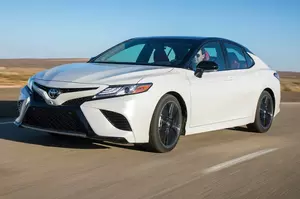
2018 Camry VIII (XV70)

2015 Camry VII (XV50, facelift 2014)
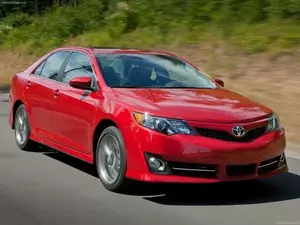
2012 Camry VII (XV50)
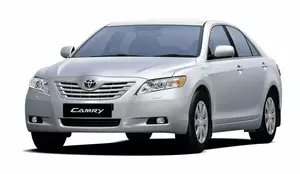
2010 Camry VI (XV40, facelift 2009)
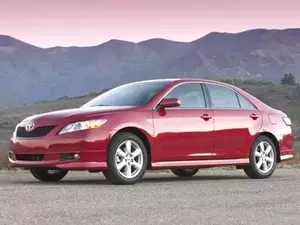
2007 Camry VI (XV40)
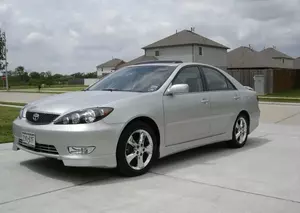
2005 Camry V (XV30, facelift 2005)

2007 Camry Solara II (facelift 2006)

2007 Camry Solara II Convertible (facelift 2006)
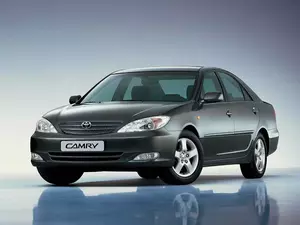
2002 Camry V (XV30)
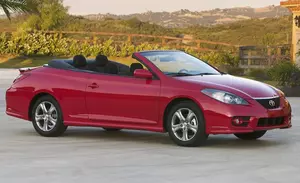
2004 Camry Solara II Convertible

2004 Camry Solara II

2001 Camry Solara I Convertible (Mark V, facelift 2001)

2001 Camry Solara I (Mark V, facelift 2001)
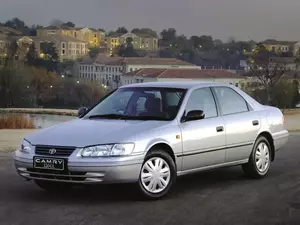
2000 Camry IV (XV20, facelift 2000)
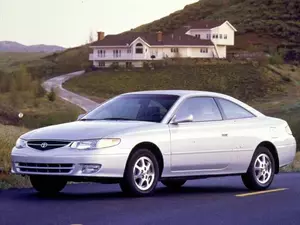
1999 Camry Solara I (Mark V)

1999 Camry Solara I Convertible (Mark V)

1996 Camry IV (XV20)

1992 Camry III Wagon (XV10)

1991 Camry III (XV10)

1986 Camry II Wagon (V20)
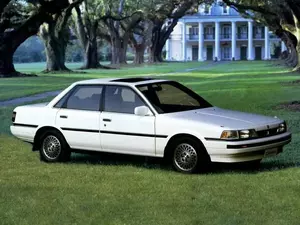
1986 Camry II (V20)
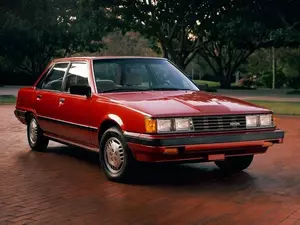
1983 Camry I (V10)

1983 Camry I Hatchback (V10)

| Vehicle | Curb weight | Difference from world's smallest | Weight to power ratio | 0—60 mph acceleration ratio | Consumption ratio |
|---|---|---|---|---|---|
| 3.5 V6 |
1690 kg / 3726 lbs |
1265 kg (2789 lbs) heavier | 7 kg to 1 hp | 232 kg/s (512 lbs/s) | - |
| 2.5 |
1555 kg / 3429 lbs |
1130 kg (2492 lbs) heavier | 9 kg to 1 hp | 165 kg/s (364 lbs/s) | - |
| 2.0 |
1570 kg / 3462 lbs |
1145 kg (2525 lbs) heavier | 10 kg to 1 hp | 150 kg/s (331 lbs/s) | - |
| Vehicle | 3.5 V6 |
|---|---|
| Curb weight |
1690 kg / 3726 lbs |
| Difference from world's smallest | 1265 kg (1265 lbs) heavier |
| Weight to power ratio | 7 kg to 1 hp |
| 0—60 mph acceleration ratio | 232 kg/s (512 lbs/s) |
| Consumption ratio | - |
| Vehicle | 2.5 |
| Curb weight |
1555 kg / 3429 lbs |
| Difference from world's smallest | 1130 kg (1130 lbs) heavier |
| Weight to power ratio | 9 kg to 1 hp |
| 0—60 mph acceleration ratio | 165 kg/s (364 lbs/s) |
| Consumption ratio | - |
| Vehicle | 2.0 |
| Curb weight |
1570 kg / 3462 lbs |
| Difference from world's smallest | 1145 kg (1145 lbs) heavier |
| Weight to power ratio | 10 kg to 1 hp |
| 0—60 mph acceleration ratio | 150 kg/s (331 lbs/s) |
| Consumption ratio | - |

| Vehicle | Curb weight | Difference from world's smallest | Weight to power ratio | 0—60 mph acceleration ratio | Consumption ratio |
|---|---|---|---|---|---|
| 2.0 |
1455 kg / 3208 lbs |
1030 kg (2271 lbs) heavier | 10 kg to 1 hp | 147 kg/s (324 lbs/s) |
202 kg/L (445 lbs/L) |
| 2.5 |
1581 kg / 3486 lbs |
1156 kg (2549 lbs) heavier | 10 kg to 1 hp | - |
277 kg/L (611 lbs/L) |
| 3.5 V6 |
1579 kg / 3482 lbs |
1154 kg (2545 lbs) heavier | 6 kg to 1 hp | - |
168 kg/L (370 lbs/L) |
| Vehicle | 2.0 |
|---|---|
| Curb weight |
1455 kg / 3208 lbs |
| Difference from world's smallest | 1030 kg (1030 lbs) heavier |
| Weight to power ratio | 10 kg to 1 hp |
| 0—60 mph acceleration ratio | 147 kg/s (324 lbs/s) |
| Consumption ratio |
202 kg/L (445 lbs/L) |
| Vehicle | 2.5 |
| Curb weight |
1581 kg / 3486 lbs |
| Difference from world's smallest | 1156 kg (1156 lbs) heavier |
| Weight to power ratio | 10 kg to 1 hp |
| 0—60 mph acceleration ratio | - |
| Consumption ratio |
277 kg/L (611 lbs/L) |
| Vehicle | 3.5 V6 |
| Curb weight |
1579 kg / 3482 lbs |
| Difference from world's smallest | 1154 kg (1154 lbs) heavier |
| Weight to power ratio | 6 kg to 1 hp |
| 0—60 mph acceleration ratio | - |
| Consumption ratio |
168 kg/L (370 lbs/L) |

| Vehicle | Curb weight | Difference from world's smallest | Weight to power ratio | 0—60 mph acceleration ratio | Consumption ratio |
|---|---|---|---|---|---|
| 3.5 V6 |
1615 kg / 3561 lbs |
1190 kg (2624 lbs) heavier | 6 kg to 1 hp | 241 kg/s (531 lbs/s) | - |
| 2.5 |
1510 kg / 3330 lbs |
1085 kg (2393 lbs) heavier | 8 kg to 1 hp | 176 kg/s (388 lbs/s) | - |
| 2.0 |
1505 kg / 3319 lbs |
1080 kg (2382 lbs) heavier | 10 kg to 1 hp | 126 kg/s (278 lbs/s) | - |
| Vehicle | 3.5 V6 |
|---|---|
| Curb weight |
1615 kg / 3561 lbs |
| Difference from world's smallest | 1190 kg (1190 lbs) heavier |
| Weight to power ratio | 6 kg to 1 hp |
| 0—60 mph acceleration ratio | 241 kg/s (531 lbs/s) |
| Consumption ratio | - |
| Vehicle | 2.5 |
| Curb weight |
1510 kg / 3330 lbs |
| Difference from world's smallest | 1085 kg (1085 lbs) heavier |
| Weight to power ratio | 8 kg to 1 hp |
| 0—60 mph acceleration ratio | 176 kg/s (388 lbs/s) |
| Consumption ratio | - |
| Vehicle | 2.0 |
| Curb weight |
1505 kg / 3319 lbs |
| Difference from world's smallest | 1080 kg (1080 lbs) heavier |
| Weight to power ratio | 10 kg to 1 hp |
| 0—60 mph acceleration ratio | 126 kg/s (278 lbs/s) |
| Consumption ratio | - |

| Vehicle | Curb weight | Difference from world's smallest | Weight to power ratio | 0—60 mph acceleration ratio | Consumption ratio |
|---|---|---|---|---|---|
| 2.5 |
1480 kg / 3263 lbs |
1055 kg (2326 lbs) heavier | 9 kg to 1 hp | - |
164 kg/L (362 lbs/L) |
| 2.4 |
1662 kg / 3665 lbs |
1237 kg (2728 lbs) heavier | 11 kg to 1 hp | - |
241 kg/L (531 lbs/L) |
| 3.5 V6 |
1570 kg / 3462 lbs |
1145 kg (2525 lbs) heavier | 6 kg to 1 hp | - |
154 kg/L (340 lbs/L) |
| Vehicle | 2.5 |
|---|---|
| Curb weight |
1480 kg / 3263 lbs |
| Difference from world's smallest | 1055 kg (1055 lbs) heavier |
| Weight to power ratio | 9 kg to 1 hp |
| 0—60 mph acceleration ratio | - |
| Consumption ratio |
164 kg/L (362 lbs/L) |
| Vehicle | 2.4 |
| Curb weight |
1662 kg / 3665 lbs |
| Difference from world's smallest | 1237 kg (1237 lbs) heavier |
| Weight to power ratio | 11 kg to 1 hp |
| 0—60 mph acceleration ratio | - |
| Consumption ratio |
241 kg/L (531 lbs/L) |
| Vehicle | 3.5 V6 |
| Curb weight |
1570 kg / 3462 lbs |
| Difference from world's smallest | 1145 kg (1145 lbs) heavier |
| Weight to power ratio | 6 kg to 1 hp |
| 0—60 mph acceleration ratio | - |
| Consumption ratio |
154 kg/L (340 lbs/L) |

| Vehicle | Curb weight | Difference from world's smallest | Weight to power ratio | 0—60 mph acceleration ratio | Consumption ratio |
|---|---|---|---|---|---|
| 2.4i 16V |
1490 kg / 3285 lbs |
1065 kg (2348 lbs) heavier | 9 kg to 1 hp | - | - |
| 3.5i V6 |
1570 kg / 3462 lbs |
1145 kg (2525 lbs) heavier | 6 kg to 1 hp | - | - |
| 2.4 |
1669 kg / 3680 lbs |
1244 kg (2743 lbs) heavier | 11 kg to 1 hp | - | - |
| Vehicle | 2.4i 16V |
|---|---|
| Curb weight |
1490 kg / 3285 lbs |
| Difference from world's smallest | 1065 kg (1065 lbs) heavier |
| Weight to power ratio | 9 kg to 1 hp |
| 0—60 mph acceleration ratio | - |
| Consumption ratio | - |
| Vehicle | 3.5i V6 |
| Curb weight |
1570 kg / 3462 lbs |
| Difference from world's smallest | 1145 kg (1145 lbs) heavier |
| Weight to power ratio | 6 kg to 1 hp |
| 0—60 mph acceleration ratio | - |
| Consumption ratio | - |
| Vehicle | 2.4 |
| Curb weight |
1669 kg / 3680 lbs |
| Difference from world's smallest | 1244 kg (1244 lbs) heavier |
| Weight to power ratio | 11 kg to 1 hp |
| 0—60 mph acceleration ratio | - |
| Consumption ratio | - |

| Vehicle | Curb weight | Difference from world's smallest | Weight to power ratio | 0—60 mph acceleration ratio | Consumption ratio |
|---|---|---|---|---|---|
| 2.4 16V |
1435 kg / 3164 lbs |
1010 kg (2227 lbs) heavier | 9 kg to 1 hp | - | - |
| 3.0 V6 |
1515 kg / 3341 lbs |
1090 kg (2404 lbs) heavier | 7 kg to 1 hp | - | - |
| 3.3 V6 |
1565 kg / 3451 lbs |
1140 kg (2514 lbs) heavier | 7 kg to 1 hp | - | - |
| Vehicle | 2.4 16V |
|---|---|
| Curb weight |
1435 kg / 3164 lbs |
| Difference from world's smallest | 1010 kg (1010 lbs) heavier |
| Weight to power ratio | 9 kg to 1 hp |
| 0—60 mph acceleration ratio | - |
| Consumption ratio | - |
| Vehicle | 3.0 V6 |
| Curb weight |
1515 kg / 3341 lbs |
| Difference from world's smallest | 1090 kg (1090 lbs) heavier |
| Weight to power ratio | 7 kg to 1 hp |
| 0—60 mph acceleration ratio | - |
| Consumption ratio | - |
| Vehicle | 3.3 V6 |
| Curb weight |
1565 kg / 3451 lbs |
| Difference from world's smallest | 1140 kg (1140 lbs) heavier |
| Weight to power ratio | 7 kg to 1 hp |
| 0—60 mph acceleration ratio | - |
| Consumption ratio | - |

| Vehicle | Curb weight | Difference from world's smallest | Weight to power ratio | 0—60 mph acceleration ratio | Consumption ratio |
|---|---|---|---|---|---|
| 2.4 16V |
1470 kg / 3241 lbs |
1045 kg (2304 lbs) heavier | 9 kg to 1 hp | - | - |
| 3.3 V6 |
1560 kg / 3440 lbs |
1135 kg (2503 lbs) heavier | 7 kg to 1 hp | - | - |
| Vehicle | 2.4 16V |
|---|---|
| Curb weight |
1470 kg / 3241 lbs |
| Difference from world's smallest | 1045 kg (1045 lbs) heavier |
| Weight to power ratio | 9 kg to 1 hp |
| 0—60 mph acceleration ratio | - |
| Consumption ratio | - |
| Vehicle | 3.3 V6 |
| Curb weight |
1560 kg / 3440 lbs |
| Difference from world's smallest | 1135 kg (1135 lbs) heavier |
| Weight to power ratio | 7 kg to 1 hp |
| 0—60 mph acceleration ratio | - |
| Consumption ratio | - |

| Vehicle | Curb weight | Difference from world's smallest | Weight to power ratio | 0—60 mph acceleration ratio | Consumption ratio |
|---|---|---|---|---|---|
| 3.3 V6 |
1640 kg / 3616 lbs |
1215 kg (2679 lbs) heavier | 8 kg to 1 hp | - | - |
| Vehicle | 3.3 V6 |
|---|---|
| Curb weight |
1640 kg / 3616 lbs |
| Difference from world's smallest | 1215 kg (1215 lbs) heavier |
| Weight to power ratio | 8 kg to 1 hp |
| 0—60 mph acceleration ratio | - |
| Consumption ratio | - |

| Vehicle | Curb weight | Difference from world's smallest | Weight to power ratio | 0—60 mph acceleration ratio | Consumption ratio |
|---|---|---|---|---|---|
| 2.4 16V |
1400 kg / 3087 lbs |
975 kg (2150 lbs) heavier | 9 kg to 1 hp | - | - |
| 3.0 V6 |
1400 kg / 3087 lbs |
975 kg (2150 lbs) heavier | 7 kg to 1 hp | - | - |
| 3.0 V6 24V |
1495 kg / 3296 lbs |
1070 kg (2359 lbs) heavier | 8 kg to 1 hp | - | - |
| 3.3 V6 |
1585 kg / 3495 lbs |
1160 kg (2558 lbs) heavier | 7 kg to 1 hp | - | - |
| Vehicle | 2.4 16V |
|---|---|
| Curb weight |
1400 kg / 3087 lbs |
| Difference from world's smallest | 975 kg (975 lbs) heavier |
| Weight to power ratio | 9 kg to 1 hp |
| 0—60 mph acceleration ratio | - |
| Consumption ratio | - |
| Vehicle | 3.0 V6 |
| Curb weight |
1400 kg / 3087 lbs |
| Difference from world's smallest | 975 kg (975 lbs) heavier |
| Weight to power ratio | 7 kg to 1 hp |
| 0—60 mph acceleration ratio | - |
| Consumption ratio | - |
| Vehicle | 3.0 V6 24V |
| Curb weight |
1495 kg / 3296 lbs |
| Difference from world's smallest | 1070 kg (1070 lbs) heavier |
| Weight to power ratio | 8 kg to 1 hp |
| 0—60 mph acceleration ratio | - |
| Consumption ratio | - |
| Vehicle | 3.3 V6 |
| Curb weight |
1585 kg / 3495 lbs |
| Difference from world's smallest | 1160 kg (1160 lbs) heavier |
| Weight to power ratio | 7 kg to 1 hp |
| 0—60 mph acceleration ratio | - |
| Consumption ratio | - |

| Vehicle | Curb weight | Difference from world's smallest | Weight to power ratio | 0—60 mph acceleration ratio | Consumption ratio |
|---|---|---|---|---|---|
| 3.3 V6 |
1575 kg / 3473 lbs |
1150 kg (2536 lbs) heavier | 7 kg to 1 hp | - | - |
| 2.4 16V |
1525 kg / 3363 lbs |
1100 kg (2426 lbs) heavier | 10 kg to 1 hp | - | - |
| Vehicle | 3.3 V6 |
|---|---|
| Curb weight |
1575 kg / 3473 lbs |
| Difference from world's smallest | 1150 kg (1150 lbs) heavier |
| Weight to power ratio | 7 kg to 1 hp |
| 0—60 mph acceleration ratio | - |
| Consumption ratio | - |
| Vehicle | 2.4 16V |
| Curb weight |
1525 kg / 3363 lbs |
| Difference from world's smallest | 1100 kg (1100 lbs) heavier |
| Weight to power ratio | 10 kg to 1 hp |
| 0—60 mph acceleration ratio | - |
| Consumption ratio | - |

| Vehicle | Curb weight | Difference from world's smallest | Weight to power ratio | 0—60 mph acceleration ratio | Consumption ratio |
|---|---|---|---|---|---|
| 2.4 16V |
1395 kg / 3076 lbs |
970 kg (2139 lbs) heavier | 9 kg to 1 hp | - | - |
| 3.3 V6 |
1470 kg / 3241 lbs |
1045 kg (2304 lbs) heavier | 7 kg to 1 hp | - | - |
| Vehicle | 2.4 16V |
|---|---|
| Curb weight |
1395 kg / 3076 lbs |
| Difference from world's smallest | 970 kg (970 lbs) heavier |
| Weight to power ratio | 9 kg to 1 hp |
| 0—60 mph acceleration ratio | - |
| Consumption ratio | - |
| Vehicle | 3.3 V6 |
| Curb weight |
1470 kg / 3241 lbs |
| Difference from world's smallest | 1045 kg (1045 lbs) heavier |
| Weight to power ratio | 7 kg to 1 hp |
| 0—60 mph acceleration ratio | - |
| Consumption ratio | - |

| Vehicle | Curb weight | Difference from world's smallest | Weight to power ratio | 0—60 mph acceleration ratio | Consumption ratio |
|---|---|---|---|---|---|
| 3.0i V6 24V |
1575 kg / 3473 lbs |
1150 kg (2536 lbs) heavier | 8 kg to 1 hp | - | - |
| Vehicle | 3.0i V6 24V |
|---|---|
| Curb weight |
1575 kg / 3473 lbs |
| Difference from world's smallest | 1150 kg (1150 lbs) heavier |
| Weight to power ratio | 8 kg to 1 hp |
| 0—60 mph acceleration ratio | - |
| Consumption ratio | - |

| Vehicle | Curb weight | Difference from world's smallest | Weight to power ratio | 0—60 mph acceleration ratio | Consumption ratio |
|---|---|---|---|---|---|
| 2.4 16V |
1395 kg / 3076 lbs |
970 kg (2139 lbs) heavier | 9 kg to 1 hp | - | - |
| 3.0i V6 24V |
1493 kg / 3292 lbs |
1068 kg (2355 lbs) heavier | 8 kg to 1 hp | - | - |
| Vehicle | 2.4 16V |
|---|---|
| Curb weight |
1395 kg / 3076 lbs |
| Difference from world's smallest | 970 kg (970 lbs) heavier |
| Weight to power ratio | 9 kg to 1 hp |
| 0—60 mph acceleration ratio | - |
| Consumption ratio | - |
| Vehicle | 3.0i V6 24V |
| Curb weight |
1493 kg / 3292 lbs |
| Difference from world's smallest | 1068 kg (1068 lbs) heavier |
| Weight to power ratio | 8 kg to 1 hp |
| 0—60 mph acceleration ratio | - |
| Consumption ratio | - |

| Vehicle | Curb weight | Difference from world's smallest | Weight to power ratio | 0—60 mph acceleration ratio | Consumption ratio |
|---|---|---|---|---|---|
| 3.0 V6 24V |
1475 kg / 3252 lbs |
1050 kg (2315 lbs) heavier | 8 kg to 1 hp | - | - |
| 2.2 |
1415 kg / 3120 lbs |
990 kg (2183 lbs) heavier | 10 kg to 1 hp | - | - |
| Vehicle | 3.0 V6 24V |
|---|---|
| Curb weight |
1475 kg / 3252 lbs |
| Difference from world's smallest | 1050 kg (1050 lbs) heavier |
| Weight to power ratio | 8 kg to 1 hp |
| 0—60 mph acceleration ratio | - |
| Consumption ratio | - |
| Vehicle | 2.2 |
| Curb weight |
1415 kg / 3120 lbs |
| Difference from world's smallest | 990 kg (990 lbs) heavier |
| Weight to power ratio | 10 kg to 1 hp |
| 0—60 mph acceleration ratio | - |
| Consumption ratio | - |

| Vehicle | Curb weight | Difference from world's smallest | Weight to power ratio | 0—60 mph acceleration ratio | Consumption ratio |
|---|---|---|---|---|---|
| 3.0i V6 24V |
1465 kg / 3230 lbs |
1040 kg (2293 lbs) heavier | 7 kg to 1 hp | - | - |
| 2.2i 16V |
1440 kg / 3175 lbs |
1015 kg (2238 lbs) heavier | 11 kg to 1 hp | - | - |
| Vehicle | 3.0i V6 24V |
|---|---|
| Curb weight |
1465 kg / 3230 lbs |
| Difference from world's smallest | 1040 kg (1040 lbs) heavier |
| Weight to power ratio | 7 kg to 1 hp |
| 0—60 mph acceleration ratio | - |
| Consumption ratio | - |
| Vehicle | 2.2i 16V |
| Curb weight |
1440 kg / 3175 lbs |
| Difference from world's smallest | 1015 kg (1015 lbs) heavier |
| Weight to power ratio | 11 kg to 1 hp |
| 0—60 mph acceleration ratio | - |
| Consumption ratio | - |

| Vehicle | Curb weight | Difference from world's smallest | Weight to power ratio | 0—60 mph acceleration ratio | Consumption ratio |
|---|---|---|---|---|---|
| 3.0i V6 24V |
1581 kg / 3486 lbs |
1156 kg (2549 lbs) heavier | 8 kg to 1 hp | - | - |
| 2.2i 16V |
1525 kg / 3363 lbs |
1100 kg (2426 lbs) heavier | 11 kg to 1 hp | - | - |
| Vehicle | 3.0i V6 24V |
|---|---|
| Curb weight |
1581 kg / 3486 lbs |
| Difference from world's smallest | 1156 kg (1156 lbs) heavier |
| Weight to power ratio | 8 kg to 1 hp |
| 0—60 mph acceleration ratio | - |
| Consumption ratio | - |
| Vehicle | 2.2i 16V |
| Curb weight |
1525 kg / 3363 lbs |
| Difference from world's smallest | 1100 kg (1100 lbs) heavier |
| Weight to power ratio | 11 kg to 1 hp |
| 0—60 mph acceleration ratio | - |
| Consumption ratio | - |

| Vehicle | Curb weight | Difference from world's smallest | Weight to power ratio | 0—60 mph acceleration ratio | Consumption ratio |
|---|---|---|---|---|---|
| Sport 2.2 |
1385 kg / 3054 lbs |
960 kg (2117 lbs) heavier | 11 kg to 1 hp | 140 kg/s (309 lbs/s) | - |
| 3.0 V6 24V |
1445 kg / 3186 lbs |
1020 kg (2249 lbs) heavier | 8 kg to 1 hp | 168 kg/s (370 lbs/s) | - |
| Vehicle | Sport 2.2 |
|---|---|
| Curb weight |
1385 kg / 3054 lbs |
| Difference from world's smallest | 960 kg (960 lbs) heavier |
| Weight to power ratio | 11 kg to 1 hp |
| 0—60 mph acceleration ratio | 140 kg/s (309 lbs/s) |
| Consumption ratio | - |
| Vehicle | 3.0 V6 24V |
| Curb weight |
1445 kg / 3186 lbs |
| Difference from world's smallest | 1020 kg (1020 lbs) heavier |
| Weight to power ratio | 8 kg to 1 hp |
| 0—60 mph acceleration ratio | 168 kg/s (370 lbs/s) |
| Consumption ratio | - |

| Vehicle | Curb weight | Difference from world's smallest | Weight to power ratio | 0—60 mph acceleration ratio | Consumption ratio |
|---|---|---|---|---|---|
| 2.2 |
1350 kg / 2977 lbs |
925 kg (2040 lbs) heavier | 10 kg to 1 hp | 136 kg/s (300 lbs/s) | - |
| 3.0 V6 24V |
1575 kg / 3473 lbs |
1150 kg (2536 lbs) heavier | 8 kg to 1 hp | 181 kg/s (399 lbs/s) |
153 kg/L (337 lbs/L) |
| Vehicle | 2.2 |
|---|---|
| Curb weight |
1350 kg / 2977 lbs |
| Difference from world's smallest | 925 kg (925 lbs) heavier |
| Weight to power ratio | 10 kg to 1 hp |
| 0—60 mph acceleration ratio | 136 kg/s (300 lbs/s) |
| Consumption ratio | - |
| Vehicle | 3.0 V6 24V |
| Curb weight |
1575 kg / 3473 lbs |
| Difference from world's smallest | 1150 kg (1150 lbs) heavier |
| Weight to power ratio | 8 kg to 1 hp |
| 0—60 mph acceleration ratio | 181 kg/s (399 lbs/s) |
| Consumption ratio |
153 kg/L (337 lbs/L) |

| Vehicle | Curb weight | Difference from world's smallest | Weight to power ratio | 0—60 mph acceleration ratio | Consumption ratio |
|---|---|---|---|---|---|
| 3.0 V6 24V |
1470 kg / 3241 lbs |
1045 kg (2304 lbs) heavier | 8 kg to 1 hp | - |
143 kg/L (315 lbs/L) |
| 2.2 |
1355 kg / 2988 lbs |
930 kg (2051 lbs) heavier | 10 kg to 1 hp | 147 kg/s (324 lbs/s) | - |
| Vehicle | 3.0 V6 24V |
|---|---|
| Curb weight |
1470 kg / 3241 lbs |
| Difference from world's smallest | 1045 kg (1045 lbs) heavier |
| Weight to power ratio | 8 kg to 1 hp |
| 0—60 mph acceleration ratio | - |
| Consumption ratio |
143 kg/L (315 lbs/L) |
| Vehicle | 2.2 |
| Curb weight |
1355 kg / 2988 lbs |
| Difference from world's smallest | 930 kg (930 lbs) heavier |
| Weight to power ratio | 10 kg to 1 hp |
| 0—60 mph acceleration ratio | 147 kg/s (324 lbs/s) |
| Consumption ratio | - |

| Vehicle | Curb weight | Difference from world's smallest | Weight to power ratio | 0—60 mph acceleration ratio | Consumption ratio |
|---|---|---|---|---|---|
| 2.0 GLi 16V |
1280 kg / 2822 lbs |
855 kg (1885 lbs) heavier | 11 kg to 1 hp | 139 kg/s (306 lbs/s) | - |
| 2.0 Turbo-D |
1155 kg / 2547 lbs |
730 kg (1610 lbs) heavier | 14 kg to 1 hp | 81 kg/s (179 lbs/s) | - |
| 2.0 GLi |
1280 kg / 2822 lbs |
855 kg (1885 lbs) heavier | 10 kg to 1 hp | 139 kg/s (306 lbs/s) | - |
| 2.5 V6 24V |
1425 kg / 3142 lbs |
1000 kg (2205 lbs) heavier | 9 kg to 1 hp | 162 kg/s (357 lbs/s) | - |
| Vehicle | 2.0 GLi 16V |
|---|---|
| Curb weight |
1280 kg / 2822 lbs |
| Difference from world's smallest | 855 kg (855 lbs) heavier |
| Weight to power ratio | 11 kg to 1 hp |
| 0—60 mph acceleration ratio | 139 kg/s (306 lbs/s) |
| Consumption ratio | - |
| Vehicle | 2.0 Turbo-D |
| Curb weight |
1155 kg / 2547 lbs |
| Difference from world's smallest | 730 kg (730 lbs) heavier |
| Weight to power ratio | 14 kg to 1 hp |
| 0—60 mph acceleration ratio | 81 kg/s (179 lbs/s) |
| Consumption ratio | - |
| Vehicle | 2.0 GLi |
| Curb weight |
1280 kg / 2822 lbs |
| Difference from world's smallest | 855 kg (855 lbs) heavier |
| Weight to power ratio | 10 kg to 1 hp |
| 0—60 mph acceleration ratio | 139 kg/s (306 lbs/s) |
| Consumption ratio | - |
| Vehicle | 2.5 V6 24V |
| Curb weight |
1425 kg / 3142 lbs |
| Difference from world's smallest | 1000 kg (1000 lbs) heavier |
| Weight to power ratio | 9 kg to 1 hp |
| 0—60 mph acceleration ratio | 162 kg/s (357 lbs/s) |
| Consumption ratio | - |

| Vehicle | Curb weight | Difference from world's smallest | Weight to power ratio | 0—60 mph acceleration ratio | Consumption ratio |
|---|---|---|---|---|---|
| 1.8 |
1124 kg / 2478 lbs |
699 kg (1541 lbs) heavier | 12 kg to 1 hp | 99 kg/s (218 lbs/s) |
141 kg/L (311 lbs/L) |
| 2.0 GLi |
1405 kg / 3098 lbs |
980 kg (2161 lbs) heavier | 11 kg to 1 hp | 146 kg/s (322 lbs/s) | - |
| 2.0 GLi 16V |
1205 kg / 2657 lbs |
780 kg (1720 lbs) heavier | 10 kg to 1 hp | 135 kg/s (298 lbs/s) | - |
| 2.0 Turbo-D |
1230 kg / 2712 lbs |
805 kg (1775 lbs) heavier | 15 kg to 1 hp | 90 kg/s (198 lbs/s) | - |
| 2.5 V6 GXi |
1225 kg / 2701 lbs |
800 kg (1764 lbs) heavier | 8 kg to 1 hp | 142 kg/s (313 lbs/s) | - |
| Vehicle | 1.8 |
|---|---|
| Curb weight |
1124 kg / 2478 lbs |
| Difference from world's smallest | 699 kg (699 lbs) heavier |
| Weight to power ratio | 12 kg to 1 hp |
| 0—60 mph acceleration ratio | 99 kg/s (218 lbs/s) |
| Consumption ratio |
141 kg/L (311 lbs/L) |
| Vehicle | 2.0 GLi |
| Curb weight |
1405 kg / 3098 lbs |
| Difference from world's smallest | 980 kg (980 lbs) heavier |
| Weight to power ratio | 11 kg to 1 hp |
| 0—60 mph acceleration ratio | 146 kg/s (322 lbs/s) |
| Consumption ratio | - |
| Vehicle | 2.0 GLi 16V |
| Curb weight |
1205 kg / 2657 lbs |
| Difference from world's smallest | 780 kg (780 lbs) heavier |
| Weight to power ratio | 10 kg to 1 hp |
| 0—60 mph acceleration ratio | 135 kg/s (298 lbs/s) |
| Consumption ratio | - |
| Vehicle | 2.0 Turbo-D |
| Curb weight |
1230 kg / 2712 lbs |
| Difference from world's smallest | 805 kg (805 lbs) heavier |
| Weight to power ratio | 15 kg to 1 hp |
| 0—60 mph acceleration ratio | 90 kg/s (198 lbs/s) |
| Consumption ratio | - |
| Vehicle | 2.5 V6 GXi |
| Curb weight |
1225 kg / 2701 lbs |
| Difference from world's smallest | 800 kg (800 lbs) heavier |
| Weight to power ratio | 8 kg to 1 hp |
| 0—60 mph acceleration ratio | 142 kg/s (313 lbs/s) |
| Consumption ratio | - |

| Vehicle | Curb weight | Difference from world's smallest | Weight to power ratio | 0—60 mph acceleration ratio | Consumption ratio |
|---|---|---|---|---|---|
| 2.0 |
1055 kg / 2326 lbs |
630 kg (1389 lbs) heavier | 10 kg to 1 hp | 97 kg/s (214 lbs/s) | - |
| 1.8 Turbo-D |
1100 kg / 2426 lbs |
675 kg (1489 lbs) heavier | 15 kg to 1 hp | 81 kg/s (179 lbs/s) | - |
| 1.8 |
1045 kg / 2304 lbs |
620 kg (1367 lbs) heavier | 12 kg to 1 hp | 92 kg/s (203 lbs/s) | - |
| 2.0 LE |
1188 kg / 2620 lbs |
763 kg (1683 lbs) heavier | 13 kg to 1 hp | - |
183 kg/L (404 lbs/L) |
| Vehicle | 2.0 |
|---|---|
| Curb weight |
1055 kg / 2326 lbs |
| Difference from world's smallest | 630 kg (630 lbs) heavier |
| Weight to power ratio | 10 kg to 1 hp |
| 0—60 mph acceleration ratio | 97 kg/s (214 lbs/s) |
| Consumption ratio | - |
| Vehicle | 1.8 Turbo-D |
| Curb weight |
1100 kg / 2426 lbs |
| Difference from world's smallest | 675 kg (675 lbs) heavier |
| Weight to power ratio | 15 kg to 1 hp |
| 0—60 mph acceleration ratio | 81 kg/s (179 lbs/s) |
| Consumption ratio | - |
| Vehicle | 1.8 |
| Curb weight |
1045 kg / 2304 lbs |
| Difference from world's smallest | 620 kg (620 lbs) heavier |
| Weight to power ratio | 12 kg to 1 hp |
| 0—60 mph acceleration ratio | 92 kg/s (203 lbs/s) |
| Consumption ratio | - |
| Vehicle | 2.0 LE |
| Curb weight |
1188 kg / 2620 lbs |
| Difference from world's smallest | 763 kg (763 lbs) heavier |
| Weight to power ratio | 13 kg to 1 hp |
| 0—60 mph acceleration ratio | - |
| Consumption ratio |
183 kg/L (404 lbs/L) |

| Vehicle | Curb weight | Difference from world's smallest | Weight to power ratio | 0—60 mph acceleration ratio | Consumption ratio |
|---|---|---|---|---|---|
| 1.8 |
1095 kg / 2414 lbs |
670 kg (1477 lbs) heavier | 12 kg to 1 hp | 96 kg/s (212 lbs/s) | - |
| 2.0 GLi |
1095 kg / 2414 lbs |
670 kg (1477 lbs) heavier | 10 kg to 1 hp | 100 kg/s (221 lbs/s) | - |
| Vehicle | 1.8 |
|---|---|
| Curb weight |
1095 kg / 2414 lbs |
| Difference from world's smallest | 670 kg (670 lbs) heavier |
| Weight to power ratio | 12 kg to 1 hp |
| 0—60 mph acceleration ratio | 96 kg/s (212 lbs/s) |
| Consumption ratio | - |
| Vehicle | 2.0 GLi |
| Curb weight |
1095 kg / 2414 lbs |
| Difference from world's smallest | 670 kg (670 lbs) heavier |
| Weight to power ratio | 10 kg to 1 hp |
| 0—60 mph acceleration ratio | 100 kg/s (221 lbs/s) |
| Consumption ratio | - |